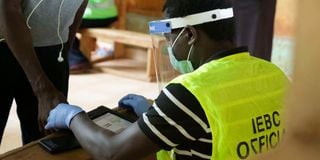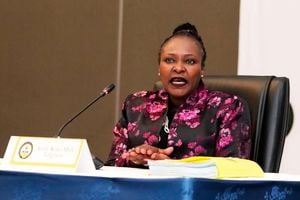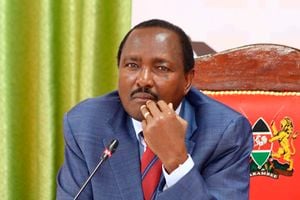
An Independent Election and Boundaries Commission (IEBC) official uses the Kems kit to read the fingerprints of a voter.
Philip Ochieng, the lord rest his witty soul in eternal, and hopefully suitably literate, peace, was a master communicator. He was a voracious reader, debater and bully and his writing was heavy with learning. When he wasn’t off beating someone for “illiteracy” – the condemnation he attached to all errors – or arguing some anodyne points of grammar with frightening inflexibility, he was a humour machine. Everything about him was laughter and fun; he moved from being the master of one-liners to the master of one-worders. I remember asking him, “Philip, are you going home?”. He was my colleague after all, we were doing the same job and I could see he was already fully suited and lugging a pile of books and newspapers.
He stopped, gave it some thought, smartly turned on his heel and deadpanned: “Eventually.” One word that told you there was a long night of riotous carousal in his immediate future and that home would be the final full stop. At the risk of overthinking, Philip’s brain had been fashioned by a lifetime in the newsroom to speak in code, heavily loaded words and constructions which contained a lot more meaning than what was written or uttered. That’s what headlines do, they transmit a lot more than what is contained in the words.
So when Philip found us smoking downstairs, he would bark: “Old technology!”
In his head, I think, “old technology” did not mean outdated or obsolete, it meant primitive, ungentlemanly, shallow, “you should know better” kind of thing, and applied to a whole range of repulsive indulgences running from smoking to careless sexual behaviour and other sins common to young people. I suspect it covered drinking anything other than the ghastly Red Label that Philip so loved and excluded staggering home in a stupor and often busting one’s collar bones. In fairness, when he did finally condescend to taste Famous Grouse, a finer blend, he loved the viscous fire, though perhaps not the price.
A lot of the measures Kenya Kwanza uses to exercise and stay in power are what Philip would have termed “old technology”; they might work in the short term, but their corrosion leaves a dark mark in the nation’s soul. The continuation of the practice of mysterious slaughter and discovery of bodies which we all thought we left behind, mega-corruption which benefits a few, but damages the country indelibly and embarrassing incompetence, accompanied by hordes of slimy characters collecting bribes like farmers picking tea are some examples. My own experience at JKIA is that you have to pay a Sh1,000 bribe to get into the terminal building at international departures or risk missing your flight. Imagine the shame.
The worst is the excessive politicisation and dithering over the formation of the Independent Electoral and Boundaries Commission, meaning that Kenya has not been able to conduct a by-election or review boundaries since former chairman Wafula Chebukati and his two allies, commissioners Boya Molu and Abdi Guliye, left office last January at the expiry of their terms. Juliana Cherera, Francis Wanderi and Justus Nyang’aya, the refuseniks who condemned Chebukati’s results, resigned under pressure while Irene Masit went to the wire and was fired by a tribunal.
Mr Chebukati has had his hand kissed by Kenya Kwanza, praised to the high heavens and feted to the rafters. But the rumours doing the rounds during the election, dark unsubstantiated whispers of auctions and skullduggery, left voters with a massive sense of disenfranchisement and the despairing belief that our vote does not matter, what matters is what the chairman, supported by the British and American ambassadors and subsequently sanctified by the Supreme Court, announces. The process, which is supposed to be free, fair and seen to be so, gets lost somewhere there. I mean, there are fictitious schools, which were used as polling stations and from which, from what I have been seeing on social media, results were received, incorporated and announced.
This, to my way of thinking is a France 1958 moment, when a desperate nation invited its hero, Charles de Gaulle, to write a constitution to save it from squabbling politicians who had rendered it ungovernable. He wrote a constitution creating a powerful presidency and a weak parliament and I hope that has served his nation well, the drama now taking place at the Elysée notwithstanding.
The process of hiring a new IEBC is buried even deeper in politics than before, with the byzantine process giving politicians and their parties complete sway in the appointment of the selectors of commissioners. The chairman is now a Museveni, all powerful, no one can do the job in his or her absence. The politicians will not appoint people who will defend and protect our democracy, they will pick people whom they can manipulate.
If I was to form an electoral commission, I’d have in it Kenyans of integrity and courage to call the political class to order: I’d have Lt Gen Daniel Opande, Dr Willy Mutunga, I’d probably bring in Justice Kenneth Marende for the sheer judicial stubbornness, I’d bring in an eminent political science professor from Ivy League college with all the models to bore the politicians into a comma.
Hell, I might even recall Lady Justice Nancy Barasa to come pull their ears.
Mr Mathiu, a media consultant at Steward-Africa, is a former Editor-in-Chief of Nation Media Group. [email protected].










